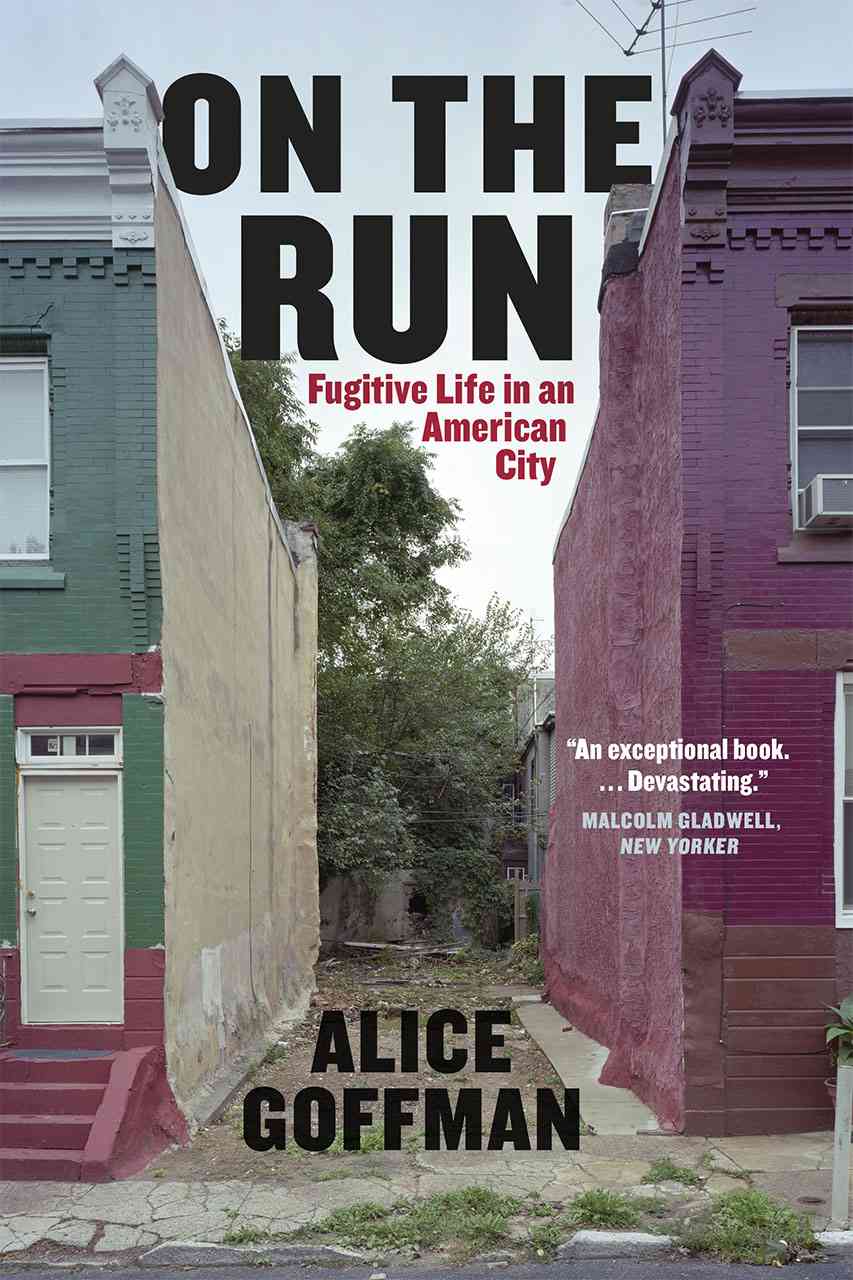
Randall Collins, whose course she was taking when she was writing in the black notebooks, put it: ‘‘She got in deep enough so that not only does she understand things from their point of view, she doesn’t give priority to laws, official morals, all the things that conventional people take for granted. I not only am not going to play the shock game, but I don’t have much respect for people who can’t see that their being shocked is part of the way their social world is constructed around them.’’
The New York Times Magazine has an interesting, thoughtful, and I think fair take on sociologist Alice Goffman and the book–On the Run–that has created more sociological controversy than anything else in memory.
I read her book because I’ve become fascinated by criminal justice (and racial injustice) in the U.S., and there are few more in-depth, well-written, emotionally powerful academic books.
I followed the controversy because I think it’s an important methodological discussion–what goes in 21st century ethnography, not to mention popular academic writing.
Unfortunately I think it also shows academics at their worst: pugnacious, committed to reproducing their own style and narrow view, jealous, and very bad at communicating in a civil way.
Here is a thoughtful take on how Goffman pissed off both sociologists and journalists at the same time:
Most of the problems ‘‘On the Run’’ has encountered, especially outside the field, have to do with the fact that it falls between the stools of journalism and ethnography. If the book was too journalistic — too descriptive, too irresponsible, too sensationalistic, too taken with its own first-person involvement — to count as properly rigorous sociology, it was too sociological to count, for many journalists, as proper reporting. Most journalists believe that true stories are necessarily personal, about the ways particular people choose to act in the world; the language of journalism, like the language of law, is almost always the language of individual moral responsibility. For a sociologist, whose profession since the turn of the century has taken it as axiomatic that society is primary to the individual, the language of individual moral responsibility is often a way of avoiding talk about structural conditions that favor the powerful.
My view hasn’t really changed from before: this is a deeply insightful book with some serious flaws, mostly flaws of a young scholar. Flaws magnified by taking the risk of writing for a more popular audience.
To those who say “but there are huge ethnical and methodological issues!” I say: show me the dissertation that is any different. I made a lot of similar mistakes as a PhD student working in northern Uganda. A main difference is that nobody really cared about the system hurting poor black men in Africa. And (maybe as importantly) I wasn’t nearly as good a writer at the time. But if anyone ever took the same magnifying glass to my work, they’d find equally serious problems.
In the end, Goffman’s was the most provocative, well-written, sociology book I have read. I think the main lesson for sociologists, not to mention my political science and economics colleagues, is the great risk but the greater importance of writing for a broad audience.
To paraphrase Ezra Klein, the public isn’t too stupid or uninterested to read your research. You’re just doing a bad job at communicating it.
Update: See Jesse Singal’s excellent take.


52 Responses
I think you nailed it with ‘To paraphrase Ezra Klein, the public isn’t too stupid or uninterested to read your research. You’re just doing a bad job at communicating it.’
In 6th grade I bought 8 Ball Chicks – it was the first book I bought form the sociology section of B&N. It was quickly followed by It’s The Little Things, Pink Think, Odd Girl Out, and There Are No Children Here. From then on I only read non-fiction books by journalists or memoirs. Those books – while not methodologically sound – had a profound impact on what I chose to do with the rest of my life and how I viewed the world. That’s important.
Goffman’s colleagues should be celebrating the fact that their field is getting such publicity from the mainstream public. Let’s be honest, publishing in an academic journal rarely influences the real world outside of academia. But books like these do. With that comes a danger and a huge responsibility, of course. But it seems that Goffman’s work is much more based in reality and sensitive to the community she protects and serves than say something like Kony 2012. And I would much rather have the youth of today read her book than learn about the world through the lenses of organizations like Invisible Children and Kiva.
Perhaps, in this case, but then there this is Venkatesh’s awful, awful work being glamourised; see http://chronicle.com/blognetwork/tenuredradical/2009/04/puff-magic-sociologist-review-of-sudhir/
RT @tukopamoja: from Professor Blattman (@cblatts), paraphrasing @EzraKlein https://t.co/YlskHxfUdr https://t.co/7XJkaHWlz1
RT @tukopamoja: from Professor Blattman (@cblatts), paraphrasing @EzraKlein https://t.co/YlskHxfUdr https://t.co/7XJkaHWlz1
Sociology ganged up on one of its brightest junior scholars, and here’s why I think you should take her side https://t.co/eVZLU4CdxF
RT @tukopamoja: from Professor Blattman (@cblatts), paraphrasing @EzraKlein https://t.co/YlskHxfUdr https://t.co/7XJkaHWlz1
Sociology ganged up on one of its brightest junior scholars, and here’s why I think you should take her side https://t.co/G9FziTa7UZ
RT @tukopamoja: from Professor Blattman (@cblatts), paraphrasing @EzraKlein https://t.co/YlskHxfUdr https://t.co/7XJkaHWlz1
RT @cblatts: Sociology ganged up on one of its brightest jr scholars. Here’s why u should take her side https://t.co/bUh8x2gcYp https://t.c…
RT @tukopamoja: from Professor Blattman (@cblatts), paraphrasing @EzraKlein https://t.co/YlskHxfUdr https://t.co/7XJkaHWlz1
RT @cblatts: Sociology ganged up on one of its brightest jr scholars. Here’s why u should take her side https://t.co/bUh8x2gcYp https://t.c…
RT @cblatts: Sociology ganged up on one of its brightest jr scholars. Here’s why u should take her side https://t.co/bUh8x2gcYp https://t.c…
Sociology ganged up on one of its brightest scholars, and here’s why you should take her side https://t.co/hL1t8Gik1T #blogs-eco #feedly
RT @cblatts: Sociology ganged up on one of its brightest jr scholars. Here’s why u should take her side https://t.co/bUh8x2gcYp https://t.c…
RT @tukopamoja: from Professor Blattman (@cblatts), paraphrasing @EzraKlein https://t.co/YlskHxfUdr https://t.co/7XJkaHWlz1
RT @tukopamoja: from Professor Blattman (@cblatts), paraphrasing @EzraKlein https://t.co/YlskHxfUdr https://t.co/7XJkaHWlz1
RT @tukopamoja: from Professor Blattman (@cblatts), paraphrasing @EzraKlein https://t.co/YlskHxfUdr https://t.co/7XJkaHWlz1
RT @tukopamoja: from Professor Blattman (@cblatts), paraphrasing @EzraKlein https://t.co/YlskHxfUdr https://t.co/7XJkaHWlz1
RT @tukopamoja: from Professor Blattman (@cblatts), paraphrasing @EzraKlein https://t.co/YlskHxfUdr https://t.co/7XJkaHWlz1
RT @tukopamoja: from Professor Blattman (@cblatts), paraphrasing @EzraKlein https://t.co/YlskHxfUdr https://t.co/7XJkaHWlz1
RT @tukopamoja: from Professor Blattman (@cblatts), paraphrasing @EzraKlein https://t.co/YlskHxfUdr https://t.co/7XJkaHWlz1
RT @tukopamoja: from Professor Blattman (@cblatts), paraphrasing @EzraKlein https://t.co/YlskHxfUdr https://t.co/7XJkaHWlz1
RT @tukopamoja: from Professor Blattman (@cblatts), paraphrasing @EzraKlein https://t.co/YlskHxfUdr https://t.co/7XJkaHWlz1
RT @tukopamoja: from Professor Blattman (@cblatts), paraphrasing @EzraKlein https://t.co/YlskHxfUdr https://t.co/7XJkaHWlz1
RT @tukopamoja: from Professor Blattman (@cblatts), paraphrasing @EzraKlein https://t.co/YlskHxfUdr https://t.co/7XJkaHWlz1
RT @tukopamoja: from Professor Blattman (@cblatts), paraphrasing @EzraKlein https://t.co/YlskHxfUdr https://t.co/7XJkaHWlz1
RT @tukopamoja: from Professor Blattman (@cblatts), paraphrasing @EzraKlein https://t.co/YlskHxfUdr https://t.co/7XJkaHWlz1
from Professor Blattman (@cblatts), paraphrasing @EzraKlein https://t.co/YlskHxfUdr https://t.co/7XJkaHWlz1
Great discussion of ethics & methods by @cblatts https://t.co/1Vn3YXbVqQ @DavidSkarbek @MeadowcroftJohn @DrAdrianBlau
“Sociology ganged up on 1 of its bright junior scholars and I think you should take her side” https://t.co/fvXElFZJjY #development #feedly
@dirtydenys C’est la fille de. Pour un résumé de l’affaire: https://t.co/hL1t8Gik1T (suivre les liens). Moi j’ai adoré le livre
Sociology ganged up on one of its brightest junior scholars – Chris Blattman https://t.co/V9uK1YgseY
RT @cblatts: Sociology ganged up on one of its brightest jr scholars. Here’s why u should take her side https://t.co/bUh8x2gcYp https://t.c…
RT @cblatts: Sociology ganged up on one of its brightest jr scholars. Here’s why u should take her side https://t.co/bUh8x2gcYp https://t.c…
You know, when right wingers cry “witch hunt”, SJWs go nuts about how that’s disrespectful to actual people accused of being witches in low-IQ lands. I cry hypocrisy.
Question #2 is a distraction. Question #3: none.
“I read her book because I’ve become fascinated by criminal justice (and racial injustice) in the U.S., and there are few more in-depth, well-written, emotionally powerful academic books.”
-Racial injustice pretty much all happens within races, not between them. Unless it’s the Tibetans or Uyghurs.
“I say: show me the dissertation that is any different. I made a lot of similar mistakes as a PhD student working in northern Uganda.”
-Uh, in Goffman’s case, those weren’t mistakes.
And you don’t explain why we should take her side anywhere here.
-Author of the Marginal Counterrevolution, which continues its neverending process of countering the Marginal Revolution.
RT @cblatts: Sociology ganged up on one of its brightest jr scholars. Here’s why u should take her side https://t.co/bUh8x2gcYp https://t.c…
RT @cblatts: Sociology ganged up on one of its brightest jr scholars. Here’s why u should take her side https://t.co/bUh8x2gcYp https://t.c…
Sociology ganged up on one of its brightest junior scholars, and here’s why I think you should take her side: … https://t.co/4HUAlrRXaj
RT @cblatts: Sociology ganged up on one of its brightest jr scholars. Here’s why u should take her side https://t.co/bUh8x2gcYp https://t.c…
RT @cblatts: Sociology ganged up on one of its brightest jr scholars. Here’s why u should take her side https://t.co/bUh8x2gcYp https://t.c…
RT @cblatts: Sociology ganged up on one of its brightest jr scholars. Here’s why u should take her side https://t.co/bUh8x2gcYp https://t.c…
Public intellectuals do not engender the same level of respect in the U.S. as they once did, and certainly not as much as they continue to do in Europe and South America.
Partly this is due to how the U.S. has increasingly come to believe specialization equals authority, ignoring how a broad outlook often reveals parallel “facts” and systems that buttress specific conclusions.
It’s that kind of narrow, safe thinking that keeps public policy in the many ruts that render it so often so ineffective.
Thanks for this post.
RT @cblatts: Sociology ganged up on one of its brightest jr scholars. Here’s why u should take her side https://t.co/bUh8x2gcYp https://t.c…
“the public isn’t too stupid or uninterested to read your research. You’re just doing a bad job at communicating it” https://t.co/xMudHzw9Ut
Take-away from #Ontherun controversy for PhDs: the great risk but greater importance of writing for a broad audience https://t.co/trXO1pD8sb
RT @cblatts: Sociology ganged up on one of its brightest jr scholars. Here’s why u should take her side https://t.co/bUh8x2gcYp https://t.c…
RT @cblatts: Sociology ganged up on one of its brightest jr scholars. Here’s why u should take her side https://t.co/bUh8x2gcYp https://t.c…
RT @cblatts: Sociology ganged up on one of its brightest jr scholars. Here’s why u should take her side https://t.co/bUh8x2gcYp https://t.c…
RT @cblatts: Sociology ganged up on one of its brightest jr scholars. Here’s why u should take her side https://t.co/bUh8x2gcYp https://t.c…
RT @cblatts: Sociology ganged up on one of its brightest jr scholars. Here’s why u should take her side https://t.co/bUh8x2gcYp https://t.c…
RT @cblatts: Sociology ganged up on one of its brightest jr scholars. Here’s why u should take her side https://t.co/bUh8x2gcYp https://t.c…
Sociology ganged up on one of its brightest jr scholars. Here’s why u should take her side https://t.co/bUh8x2gcYp https://t.co/hPgmylbiQY